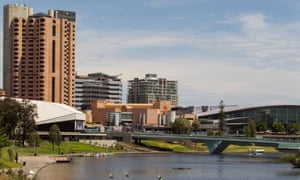South Australia will investigate whether flammable cladding has been used in Adelaide buildings following the fatal Grenfell Tower fire in London, and Queensland has urged the federal government to crack down on cheap imports from China.
Scotland Yard has launched a criminal investigation into the Grenfell fire, which left at least 17 dead.
Cheap, flammable cladding is thought to have been instrumental in the fire’s rapid spread, prompting concern about its use in buildings across Australia.
Fire safety engineers have warned that the material may be as widespread as asbestos, and the independent senator Nick Xenophon has called for a national audit.
Deadly blaze engulfs west London tower block
On Friday, the South Australian government said it would audit buildings in Adelaide for dangerous cladding. That audit will prioritise residential buildings. Scotland Yard has launched a criminal investigation into the Grenfell fire, which left at least 17 dead.
Cheap, flammable cladding is thought to have been instrumental in the fire’s rapid spread, prompting concern about its use in buildings across Australia.
Fire safety engineers have warned that the material may be as widespread as asbestos, and the independent senator Nick Xenophon has called for a national audit.
Deadly blaze engulfs west London tower block
The West Australian government is also planning an audit of state-owned dwellings, according to the West Australian newspaper.
Cheap, imported cladding was found to have contributed to the Lacrosse fire in Melbourne in 2014, and a Victorian audit found 84 of 170 inspected buildings were non-compliant with Australian building codes.
In 2015, the Construction, Forestry, Mining and Energy Union wrote to state, territory and federal governments, urging them to audit buildings for flammable cladding. Only Victoria conducted such an audit.
“It’s pretty simple, cladding should not catch fire,” the CFMEU national secretary, Dave Noonan, told Guardian Australia.
“There are materials that don’t catch fire, there are products that don’t catch fire, but elements of the industry prefer to install material that does catch fire because it’s cheaper.”
South Australia’s deputy premier, John Rau, wrote to all councils last year, following the investigation into the Lacrosse fire, asking them to prioritise the inspection of buildings with aluminium composite panelling.
Rau also asked councils and private certifiers to report any evidence of non-compliance.
“No concerns were raised in response to that request,” the spokesman said.
The Queensland government introduced legislation last month to tighten its regulation of flammable cladding, giving regulators the power to stop the sale or installation of unsafe products, and compel developers to remove them, even after a building is complete. The regulator will also be allowed to enter buildings to look for dangerous cladding.
The state’s housing minister, Mick de Brenni, said the reforms would give Queensland one of the toughest regulatory environments in the country.
But he said the federal government must do more to stop cheap imports from entering the market.
“The biggest risk is cheap imported products, mostly from China,” de Brenni told Guardian Australia.
“The Commonwealth needs to take this threat of dodgy imported products as seriously as Queensland is and provide real security at our borders.”
The federal opposition has also called on the government to do more to improve building safety standards.
The opposition spokesman for innovation and industry, Kim Carr, said the government must explain what it is doing to prevent the use of flammable cladding products in Australia.
“This is an issue with national implications and Liberals must acknowledge the Commonwealth’s responsibilities, step up to the plate and act,” Carr said.
“The public have a right to know that the buildings they live in are not death traps.”
The federal Greens have also added their voice to calls for a national audit.
The Greens senator Lee Rhiannon said regulations and standards needed tightening, and any violations should be acted on immediately, including an investigation into who was responsible.
“Violations of standards when it comes to cladding is another example of dodgy developers cutting corners,” Rhiannon said.
“If sub-standard cladding is found on any public or community housing buildings, that is more proof that this sector has been squeezed by years of under-investment,” she said.
Xenophon, who chaired a Senate inquiry on the issue, said the danger had not been “taken seriously enough” following the 2014 Lacrosse fire
The CFMEU said building standards were strong, but weak enforcement was creating the risk.
Noonan also expressed concern about the lax importation restrictions on cheap building materials.
“We’re concerned about the fact that by facilitating free trade agreements and so forth that the commonwealth government has encouraged the importation of building materials from countries that have low standards or no standards,” he said.
Rhiannon said that if dangerous building materials were still being imported, it pointed to the need for more rigorous standards.
“If material is being imported that meets our standards but is nonetheless posing an unacceptable fire risk, those standards should be tightened,” she said.

No comments:
Post a Comment